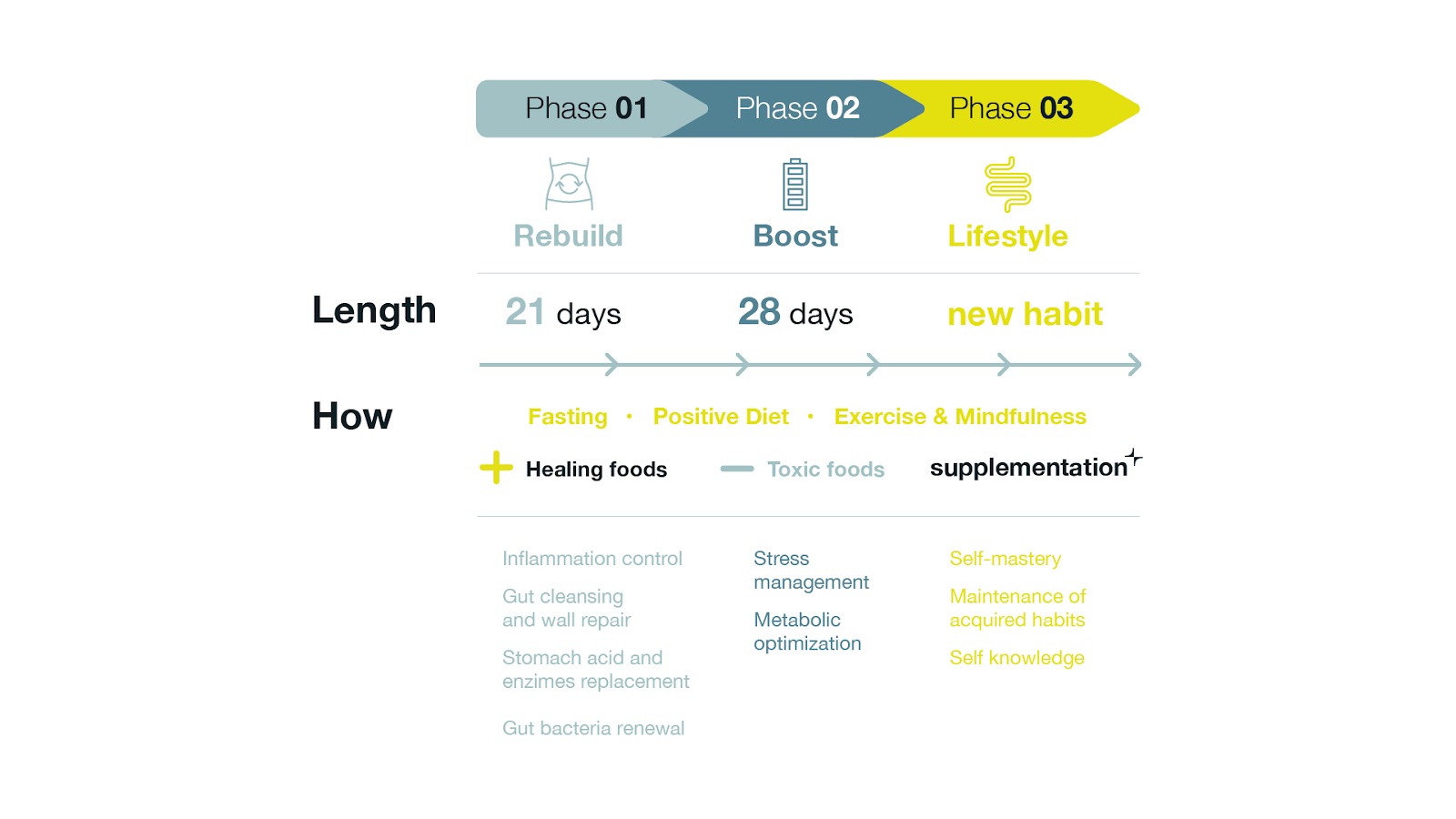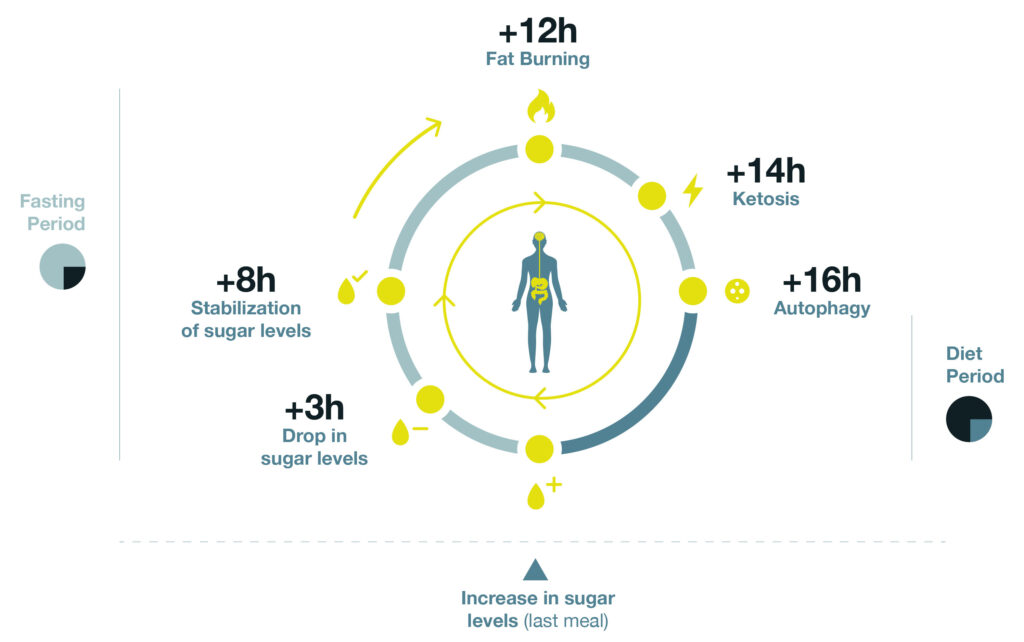PROGRAM
Our program is a gateway to a more healthy and positive life. It gives you the motivation
and guidance to make a real lifestyle change and stay in control of your health and
reach your ideal weight.
Feel like never before in less than 2 months…
ready for the challenge?
If you are considering join the “Stargut Wellness Program” you are to be congratulated! You’re about to make a decision that will change your life in just 7 weeks, with more health, energy, disposition, and self-esteem. By fulfilling the various challenges of the three phases that we propose, you will make peace with your body, through the repair and rebalancing of your Microbiome and Gut Microbiota.

Welcome to your new, healthier, younger and happier self!
What do you get with your STARGUT program?
- 7 week personalized program
- Initial evaluation and respective report
- Intermediate evaluation and respective report
- Final evaluation and respective report
- 2 on-line sessions with a “STARGUT Health Coach”
- Daily support by email or WhatsApp during the 7 weeks
- Information and support documents for all program weeks
- Educational content
- Recipe book
STARGUT WELLNESS PROGRAM
The “Stargut Wellness Program” promotes the cleansing, repair, renewal and rebalancing of the Gut Microbiota with several benefits. To achieve this goal, it adopts a strategy based on three axes of functional medicine and a sequence of small challenges, so that in less than 2 months you will feel like new!
#1. Healthy fasting
Fasting is a way for our body to get into balance (homeostasis) and manage to repair structures, since digestive processes do not occur. Scientific evidence tells us that fasting is associated with gut health, as well as having a beneficial effect on the immune system, promoting autophagy.
The human body is prepared to adapt to the lack of food and not to the frequency of eating we have nowadays. Our bodies have a set of unique proteins that are expressed or activated during the period of fasting and that are related to better brain performance and optimal survival of different parts of the body.
Imagine that your body is a dishwasher, if you constantly interrupt it, it will not complete its entire cleaning cycle. The same goes for our body.
We can then conclude that fasting can have very powerful effects on your body. From weight management and cellular cleansing to improved digestive system and mental clarity, fasting can offer a number of benefits. But what actually happens in your body, hour by hour, while you’re fasting?

From the moment we finish the last meal:
Soon after eating food, the body begins to digest and absorb nutrients. During this period, blood glucose (sugar) levels rise, and greater amounts of insulin are secreted.
Insulin is the hormone responsible for transporting sugar from the bloodstream to the cells. The amount of insulin produced depends on the composition of the meal, the amount of carbohydrates ingested and the sensitivity of each person’s body to this hormone.
Glucose that is in excess is stored in the liver and muscles as glycogen. Glycogen is the main form of stored carbohydrates and can be converted back into sugar as an energy source as needed. In excess, it is stored as fat.
During this period, levels of other hormones, including ghrelin and leptin, also change. Ghrelin is a type of hormone that stimulates hunger, and its levels decrease after the last meal.
During this phase, 3 to 4 hours after the last meal, the hormone insulin is about to finish storing the glucose that is present in excess in the blood, i.e., in cells and tissues as glycogen, more specifically in muscles and liver. For this reason, blood sugar levels begin to decrease.
As blood sugar levels drop, insulin production begins to decline and the production of another hormone, glucagon, increases, usually 8 to 12 hours after the last meal.
Glucagon causes the body to start converting stored glycogen into glucose for energy, stabilizing blood sugar levels.
During this phase, usually about 12 hours after the last meal, glycogen stores begin to run out, followed by a change in metabolism. The body starts to use fat reserves to produce energy. For this, it begins to produce hormones, such as growth hormone (GH), testosterone, noradrenaline, etc., which help in the fat burning process.
In this phase, the production of hormones that promote the burning process, prepare your body for a new phase. This army of hormones promotes a shift to a metabolic mode, in which non-hepatic glucose, ketone bodies (ketones) derived from fat and free fatty acids are used to supply energy to the heart, brain and other vital organs. This phenomenon usually starts after 14 to 16 hours since the last meal and you can feel particularly focused and productive at this stage, as ketones activate nerve cells, strengthen intellectual capacity and develop new cells from stem cells of the brain.
Normally, in healthy individuals, 16 to 24 hours after the last meal, the body starts a phenomenon called autophagy, where the body begins an internal process of cleaning and repairing damaged cells to regenerate newer and healthier cells.
#2. Positive food
We all know that there are foods that are harmful and others that are healthy… but there are some, unsuspected, that contribute to the destruction of the Microbiome and others that are authentic “workers” in the recovery of our health.
What we eat determines which bacteria we have in our Gut Microbiota, because it is through food that we nourish these organisms present in our gut, whether good or bad. Certain types of foods can be a powerful way to increase the number of beneficial bacteria.
The ingestion of foods rich in fiber, in polyphenols, fermented and with probiotics and prebiotics, is a highly effective strategy to positively change the composition of the Microbiome and Gut Microbiota.
#3. Movement and calm
Moving regularly is very important, whether in the form of physical exercise or just walking, what really matters is to avoid a sedentary life that most of us unfortunately have and that harms our health so much. Likewise, “calm” and “intellectual and mental rest” are moments that should become routine. Both are equally important, they contribute to the balance of our Microbiome, therefore to our general well-being.
The practice of physical activity is closely associated with the increase in the number of beneficial microbial species and the enrichment of microbial diversity, as well as the synthesis of short chain fatty acids (SCFAs).
High levels of stress can have harmful effects and cause the body to release the hormone cortisol. In the gut, stress can increase sensitivity, reduce blood flow and change the diversity of bacteria, increasing harmful bacteria and reducing beneficial and friendly bacteria.


